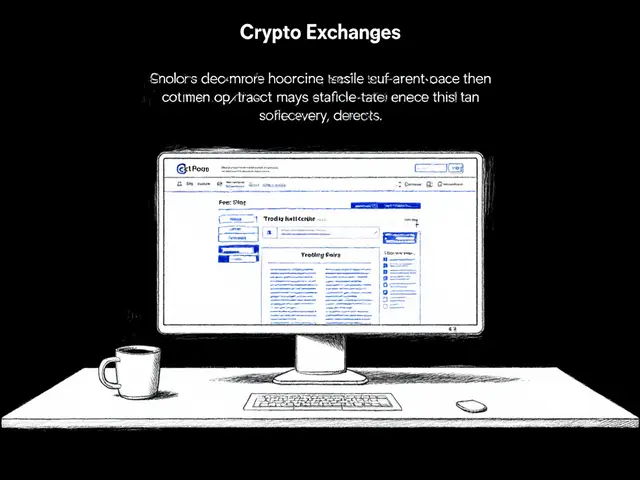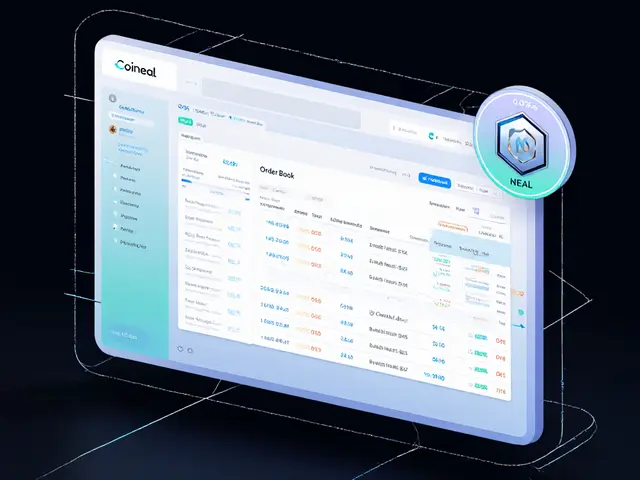REG Token Value Calculator
Current REG Information
Your REG Holdings
Calculation Results
Enter your REG holdings and holding period, then click "Calculate Value" to see projected returns.
TL;DR
- REG is the governance token that powers the RealToken real‑estate‑on‑blockchain platform.
- It isn’t mined; new tokens are created by the protocol’s own rules.
- REG trades around $0.18 (Oct2025) on DEXs like Sushiswap V3, Balancer V2 and centralized sites such as Coinbase.
- Holders can vote on ecosystem proposals, stake for passive income, and earn free REG via Learn2Earn, Assist2Earn and airdrops.
- Price is volatile - driven by crypto‑market sentiment, real‑estate news, and social media spikes.
RealToken Ecosystem Governance (REG) is a governance‑focused cryptocurrency that gives its holders a say in the RealToken platform, which links traditional real‑estate assets with blockchain technology. The token was launched to let investors participate in decision‑making while exposing them to property‑backed value.
What the REG token actually does
REG serves three core purposes within the RealToken ecosystem:
- Governance: Token holders can propose and vote on changes such as fee structures, new property listings, or partnership deals. Each token generally represents one vote, though exact weight may vary by proposal.
- Economic incentives: Staking platforms (for example, Bitget Earn) let users lock REG and earn a yield that comes from transaction fees and ecosystem rewards.
- Utility payments: REG can be sent to friends, charities, or used to pay for services inside the RealToken marketplace.
How REG is created - no mining required
Unlike Bitcoin’s proof‑of‑work model, REG does not rely on computational mining. Instead, the protocol mints new tokens according to predefined rules that kick in when certain milestones are reached (e.g., when a new property token is tokenized). This design keeps energy consumption low and aligns token supply with real‑estate activity.
Where you can buy or trade REG
REG is listed on several decentralized exchanges that operate on the Gnosis chain. The most active pairs are:
- Sushiswap V3 - REG/USDC is the highest‑volume pair, moving about $243 daily.
- Balancer V2 - offers REG/USDT and REG/DAI pools.
- Honeyswap - smaller liquidity but useful for rapid swaps.
On the centralized side, you’ll find REG on Coinbase (price ≈ $0.18), European platforms quoting €0.1284, and Korean exchanges listing it around ₩26.
How to earn REG without spending money
The project runs a handful of community‑driven reward programs:
- Learn2Earn: Complete short educational modules about real‑estate tokenization and get free REG.
- Assist2Earn: Invite friends to the Bitget platform; each successful sign‑up nets you extra REG.
- Airdrops & challenges: Ongoing contests on Discord or Twitter often distribute small REG parcels.
All earned tokens can be moved to your wallet via Bitget Convert, Bitget Swap, or direct spot‑trading.

Staking and passive income
Bitget Earn currently offers a 5‑7% APY on REG deposits, paid out in REG itself. The yield comes from transaction fees collected on the platform and a portion of the ecosystem’s growth fund. Staking periods range from 30days to 90days, with early‑withdraw penalties that protect the pool’s stability.
Factors that move the REG price
Because REG ties real‑estate exposure with crypto market dynamics, its price reacts to two broad forces:
- Crypto‑market sentiment: Bull runs in Bitcoin or Ethereum often lift all altcoins, including governance tokens.
- Real‑estate news: Major property acquisitions, zoning changes, or macro‑economic data on housing markets can create short‑term spikes.
Social media also plays a heavy role. A single tweet from a well‑known entrepreneur mentioning REG can trigger a 10‑15% price swing within minutes. Monitoring X (formerly Twitter), Discord, and Reddit is therefore essential for timing trades.
Comparison with other governance tokens
| Token | Primary Purpose | Supply Mechanism | Current Price (USD) | Main Use Cases |
|---|---|---|---|---|
| REG | Real‑estate ecosystem governance | Protocol‑minted, no mining | 0.18 | Voting, staking, payments |
| COMP | Compound protocol governance | Fixed supply, distribution via liquidity mining | 36.40 | Voting, liquidity incentives |
| UNI | Uniswap DEX governance | Fixed supply, community airdrops | 5.12 | Voting, fee rebates |
| AAVE | Lending protocol governance | Fixed supply, staking rewards | 68.70 | Voting, safety module staking |
What sets REG apart is its explicit link to tangible property assets. While COMP, UNI and AAVE focus on pure DeFi functions, REG tries to bring real‑world value into the blockchain sphere.
Risks you should consider
- Low liquidity: Daily volume averages under $4K, meaning large orders can cause slippage.
- Regulatory uncertainty: Real‑estate tokenization sits in a gray area in many jurisdictions; future rules could affect token utility.
- Project opacity: The roadmap and team details are not widely disclosed, raising questions about long‑term viability.
- Price volatility: A 43% drop over the past month shows how quickly sentiment can shift.
Do thorough due diligence, keep only a portion of your portfolio in high‑risk assets like REG, and use stop‑loss orders where possible.
Getting started - a quick‑start checklist
- Set up a non‑custodial wallet that supports the Gnosis chain (e.g., Metamask with custom RPC).
- Buy a small amount of USDC on a major exchange.
- Bridge USDC to Gnosis using the official bridge portal.
- Swap USDC for REG on Sushiswap V3 (select the REG/USDC pool).
- Stake your REG on Bitget Earn for passive returns.
- Join the RealToken Discord to stay updated on governance proposals.
Frequently Asked Questions
What is the total supply of REG?
The protocol caps REG at 501,333,738 tokens. All of them exist on the blockchain; no new tokens will be minted beyond this limit.
Can I mine REG?
No. REG uses a protocol‑minting model tied to real‑estate onboarding, so mining hardware or PoW doesn’t apply.
Where is the safest place to store REG?
A hardware wallet (LedgerNanoS/X) that supports the Gnosis chain offers the highest security. If you need frequent trading, a software wallet like Metamask is acceptable but keep only what you plan to use.
How do I participate in governance?
Connect your REG‑holding wallet to the official RealToken voting portal. Each token equals one vote unless the proposal specifies weighted voting. Proposals are posted on the Discord and voting windows usually last 48‑72hours.
Is REG a good long‑term investment?
It depends on your risk tolerance. REG offers exposure to real‑estate assets via blockchain, but its market depth is thin and regulatory risk is high. Treat it as a speculative portion of a diversified portfolio.






Dyeshanae Navarro
12 May, 2025 . 07:02 AM
REG token aims to give holders a slice of governance power. By staking, users can vote on protocol upgrades and fee distribution. The 6% APY is modest, but it encourages long‑term commitment. Understanding the tokenomics helps you decide if it fits your portfolio. In short, it’s a way to be part of the ecosystem’s direction.
Matt Potter
18 May, 2025 . 08:02 AM
Sounds like a solid move-let’s ride this wave!
Marli Ramos
24 May, 2025 . 09:02 AM
lol 😂
tim nelson
30 May, 2025 . 10:02 AM
The design tries to balance decentralization with incentives, yet the real test will be community participation. If people don’t engage, the governance model could stall. It’s a delicate dance between token holders and developers. Patience will be key as the protocol matures.
Lisa Stark
5 June, 2025 . 11:02 AM
Governance tokens like REG serve more than just a price tag. They embed voting rights directly into the economic layer, allowing holders to shape fee structures and future features. Staking amplifies that influence while offering a modest return, which can be attractive for passive investors. However, the true value derives from active participation in proposals and discussions. Careful reading of the roadmap helps assess long‑term viability. Also, keep an eye on token distribution to avoid centralization risks. In essence, REG is a tool for both financial and strategic engagement.
Logan Cates
11 June, 2025 . 12:02 PM
Sure, they just want to lock us into another hype cycle.
Shelley Arenson
17 June, 2025 . 13:02 PM
Great breakdown! 🚀 I think the calculator tool makes it easier to visualize potential returns.
Joel Poncz
23 June, 2025 . 14:02 PM
I get why some folks feel cautious-crypto can be a rollercoaster, but tools like this help make sense of it.
Kris Roberts
29 June, 2025 . 15:02 PM
Looks like the APY isn’t earth‑shattering, but the governance angle could be the real draw for community‑driven projects.
lalit g
5 July, 2025 . 16:02 PM
The token’s supply is sizable, which could dilute influence unless active voting consolidates decisions. Still, the open‑source nature gives room for improvement.
Reid Priddy
11 July, 2025 . 17:02 PM
While the whitepaper sounds polished, real adoption hinges on transparent voting mechanisms. Otherwise, it’s just another token with promises.
Shamalama Dee
17 July, 2025 . 18:02 PM
Your explanation succinctly captures the essential mechanics of the REG token. It clarifies both the financial incentives and the governance responsibilities conferred upon holders. Such clarity is invaluable for prospective participants seeking informed decisions.
scott bell
23 July, 2025 . 19:02 PM
Whoa I never thought about how voting actually changes the code it’s wild
vincent gaytano
29 July, 2025 . 20:02 PM
Oh absolutely, because every new token is just a secret plot to drain our wallets 😒
Christina Lombardi-Somaschini
4 August, 2025 . 21:02 PM
Indeed, the precision of your summary underscores the importance of aligning token economics with community stewardship. It would be prudent for investors to monitor proposal outcomes alongside price movements, thereby ensuring that governance activity translates into tangible value.
katie sears
10 August, 2025 . 22:02 PM
It is essential to recognize that governance tokens often serve as both financial assets and decision‑making instruments. Consequently, a comprehensive analysis should incorporate both market indicators and on‑chain voting patterns.
Gaurav Joshi
16 August, 2025 . 23:02 PM
Exactly, and let’s not forget the moral dimension-if the community fails to hold developers accountable, the whole ecosystem suffers.
Kathryn Moore
23 August, 2025 . 00:02 AM
REG is a governance token that essentially gives you a vote on the protocol’s future developments. The token’s utility lies in its ability to influence fee allocation, parameter changes, and new feature rollouts. By staking REG you lock up your tokens and receive a 6 % annual yield calculated on the staked amount. This yield is modest compared to some DeFi projects, but it serves to incentivize long‑term holding and participation. The total supply of roughly 501 million tokens means that individual influence is proportional to the amount you own. Large holders can therefore sway proposals, which raises concerns about centralization. The calculator on the site helps you estimate your returns based on the number of tokens and the holding period. It’s a simple tool: input your balance, set the months you plan to stay invested, and click calculate. The result shows projected earnings assuming the current price and APY remain stable. However, crypto markets are volatile, so those numbers are only a rough guide. It’s also worth noting that voting power does not increase with the length of time you hold the token; it’s strictly tied to the amount staked. Active participation in governance forums is required to actually cast votes. Some projects implement quorum thresholds, meaning a minimum percentage of total supply must vote for a proposal to pass. If quorum isn’t met, even a majority of voters can’t enact changes. Therefore, community engagement is crucial for the token’s effectiveness. In summary, REG blends modest staking rewards with governance rights, but its real value depends on active, decentralized participation.
Christine Wray
29 August, 2025 . 01:02 AM
The community aspect can’t be overstated; without active voters, the token’s purpose is diminished.
roshan nair
4 September, 2025 . 02:02 AM
Yo check it – the APY might look chill but the real spice is in the voting power you get. If you lock up a decent chunk you’ll have a louder voice when the devs drop new features. Just remember the supply is huge so you might need a big stash to make waves. Use the calculator to see how your chill returns stack up and decide if it’s worth the hustle.
Jay K
10 September, 2025 . 03:02 AM
I appreciate the thorough overview; it provides a solid foundation for anyone considering participation.
Kimberly M
16 September, 2025 . 04:02 AM
Thanks for the clear info 🙏
Navneet kaur
22 September, 2025 . 05:02 AM
So why isn’t everyone talking about this token everywhere already
Marketta Hawkins
28 September, 2025 . 06:02 AM
This is exactly what our economy needs – a home‑grown token that puts power back in the hands of real users, not foreign speculators.
Drizzy Drake
4 October, 2025 . 07:02 AM
Dude, I’ve been watching these governance tokens for a while now and I gotta say REG actually looks pretty decent when you break it down. The 6 % APY isn’t gonna make you a millionaire overnight, but it’s a steady drip that can sweeten the pot while you wait for the voting rounds to roll out. What really catches my eye is the fact that you can actually have a say in how the protocol evolves – that’s a level of involvement you don’t get with most pure “hold‑and‑hope” coins. Plus, the built‑in calculator is super handy for mapping out different scenarios, like if you plan to keep your tokens for a few months versus holding long term. I’ve seen projects where the governance is just a façade, but with REG they’re actually encouraging staking and participation, which could mean more real decentralization down the line. If you’re the type who likes to stay in the loop and maybe even pitch in on proposals, this could be a good fit. Just keep an eye on the community vibe and make sure the voting isn’t dominated by a handful of whales. All in all, it’s worth a deeper look if you’re into crypto that gives you both a modest return and a voice.